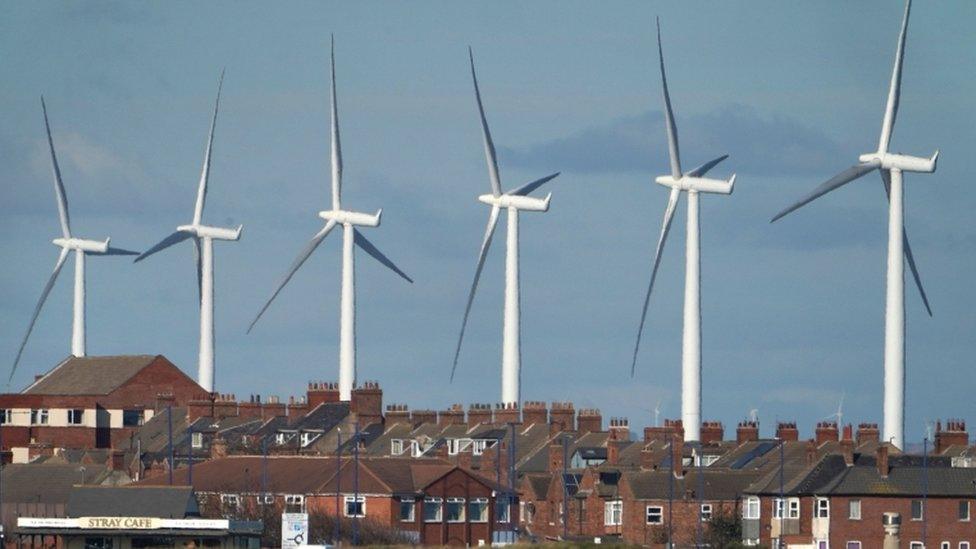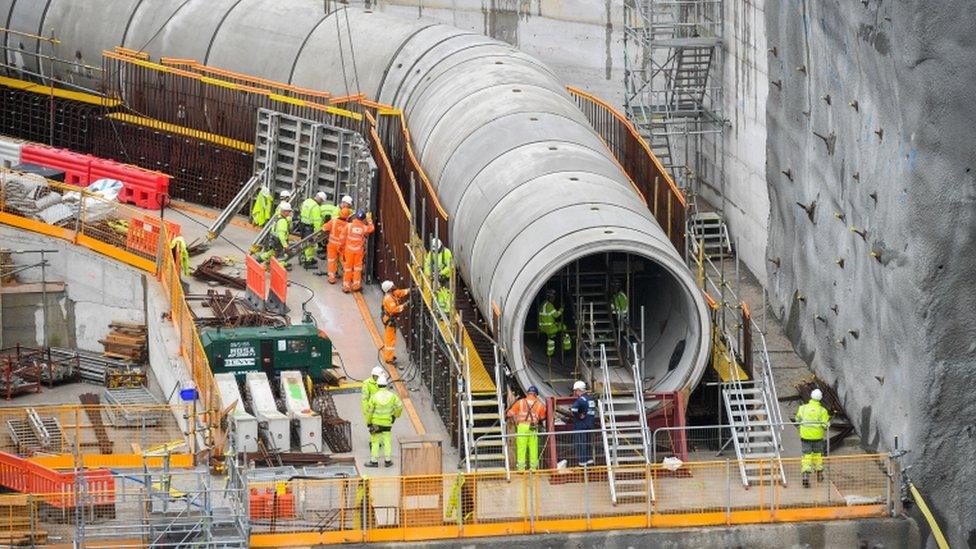Why many experts aren't impressed with the UK's energy plans
- Published

Environmentalists are disappointed there are no new incentives for home insulation
Environmentalists and many energy experts have reacted with dismay at the failure of the government's energy security strategy to cut emissions and bills in the short term. They welcome the long-term target to secure low-carbon home-grown energy supplies.
But they say it does nothing new in the short-term to reduce bills, cut emissions or decrease dependency on imported gas. They accuse the document of perversely down-playing the fastest and cheapest ways of combating energy dependency - namely, energy efficiency, onshore wind and solar power.
There's wide agreement among environmentalists, energy experts and opposition parties that the UK needs a huge insulation programme to save houses leaking heat. But the document offers no new incentives for that
A Downing Street source told me it was an energy supply strategy - not a demand strategy - even though experts point out that these are two sides of the same coin.
Energy Secretary Kwasi Kwarteng agreed the strategy would do nothing in the short-term to help reduce bills. The document was for major decisions in the longer term, he told the BBC's Today programme.
But the Treasury is reported to have blocked a plan to offer more short-term incentives to insulate homes. The government wouldn't comment on that.
Campaigners are also furious that ministers have committed to seeking more oil and gas in the North Sea - even though humans have already found enough fossil fuels to wreck the climate.
Ministers argue that home-produced gas creates fewer emissions than imported gas compressed into tanks on ships.
This is widely accepted, but critics warn that as head of the UN's climate negotiations process, the UK has a responsibility to lead other nations away from fossil fuels.
Fracking is another contentious issue. After weeks of pressure from a small group of backbenchers the document opens a new inquiry into the process of smashing rocks underground to release trapped gas.
But it would take many more years of exploration to see if firms could obtain a worthwhile amount of gas - and it's likely to stir up local opposition as it did before.
There is also growing concern of so-called "fugitive" emissions - that's gas released accidentally into the atmosphere when the rocks crack.

Meanwhile, the government's much-trailed resolve to increase offshore wind has been applauded by climate experts. They welcome the news that ministers will ease planning hold-ups.
There will be room, too, for more floating wind turbines to be used in deeper waters - and surplus energy from wind power will be used to boost the supply of hydrogen.
Onshore wind has been more contentious. It's one of the cheapest forms of new energy - and one of the fastest to install. That means it could help with bills relatively quickly.
But some Cabinet ministers have fought off a bid by the business department to ease the uniquely strict planning rules for onshore wind. They say some local people strongly object - even though polls consistently show a large majority of the population is in favour.
As for the government's plans for nuclear power - which is now roughly twice as dear as wind and solar energy - there's still no solution to disposing of nuclear waste. Others deride government hopes for mini nuclear reactors, serving individual towns and cities, warning of security concerns and a public backlash.
Some environmentalists say the nuclear price is worth paying to bolster the UK's climate law mandating near zero carbon emissions by 2050. Nuclear would ensure a proportion of the UK's electricity can be generated irrespective of the sun or wind.
But there's scepticism whether the small modular reactors liked by the government will be ready in time. Experts warn that several previous prime ministers have promised a nuclear revival and failed to deliver.

The document has supporters. The government's Climate Change Committee applauded the strategy for its commitment to supply low-carbon energy.
Its director of analysis, Mike Thompson, said: "The new commitments are hugely ambitious - they would see the UK produce more electricity from offshore wind in 2030 than it has produced from gas in any year in history. Government, business and industry will need to focus relentlessly on delivery at a scale and pace as yet unseen."
But the committee joined the chorus of annoyance at the absence of measures to cut demand. And others went further in their criticisms.
Helen Clarkson, head of the non-profit Climate Group, said: "This strategy is all about jam tomorrow when we need deep emissions cuts today.
"We have tools and technologies already available which can radically reduce our energy needs and our carbon emissions now. Energy efficiency measures - such as insulation - can deliver immediately. There's a huge opportunity for a win-win here, which the government is passing up."
Tessa Khan, from the climate campaign group Uplift, added: "This strategy is a betrayal of the millions of families across the UK who are being pushed to the brink by energy bills caused by our reliance on gas.
"Instead of supporting them with a drive to insulate homes and boost our access to cheap, clean renewable energy, the government has sided with oil and gas companies, who offer no solutions to our energy affordability crisis.
"Right now we need a real plan to help people across the country access safe, affordable energy and instead the government has added fuel to the fire."
Follow Roger on Twitter @rharrabin, external
- Published7 April 2022

- Published7 April 2022
